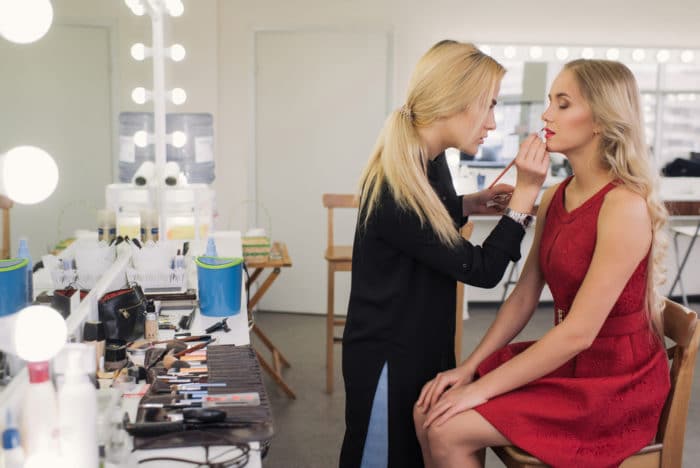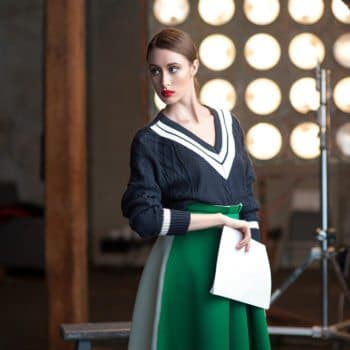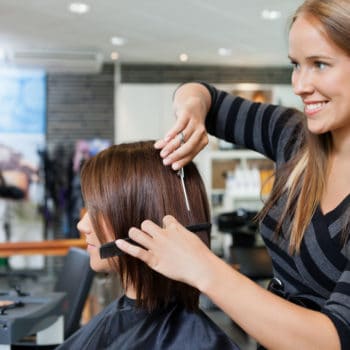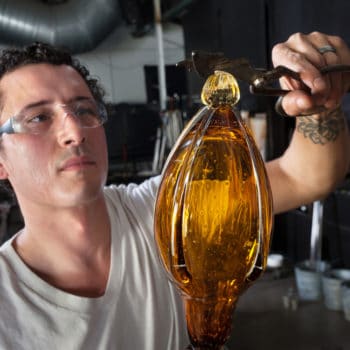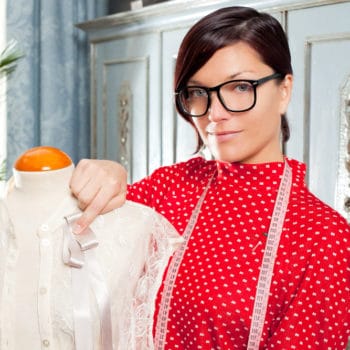Why We Love It
-
$28,770Potential Avg. Salary
-
9.8%Job Growth Rate
-
Growing DemandJob Outlook
-
Creativity FocusedCareer Attribute
Makeup artists are creative individuals who specialize in the use of makeup to create desired effects. They may apply makeup to make clients look beautiful for weddings and other special events, or they may specialize in theatrical makeup, transforming clients into otherworldly creatures for films and plays.
Recommended Schools
What is a Makeup Artist?
The following job responsibilities are common for individuals in makeup artist roles:
- Select and apply makeup products and colors that hide blemishes and highlight clients’ natural features and beauty
- Help clients choose makeup colors that work for their complexions and skin tones
- Apply theatrical makeup for stage productions, designed to make facial expressions on stage more visible
- Apply special effects makeup for TV shows and movies to transforms appearances
- Apply fashion makeup to dramatize model appearances in photo shoots and runway shows
A Day in the Life
Makeup artists specialize in the application of makeup, but that application can be used to transform appearances for a variety of reasons. Perhaps the most general form of makeup artist is applying natural-looking makeup to highlight a person’s natural beauty. These makeup artists help people prepare for weddings, award ceremonies, newscasts, and other events where makeup application is designed to make clients look natural and beautiful rather than dramatically different.
Another type of makeup artists applies makeup for theatrical performances, photo shoots, and runway shows. The goal of theatrical makeup is to apply colors that work with stage lighting to highlight actors’ facial expressions on stage in a way that the audience can see them even from a distance. For photo shoots and runway shows, makeup is often applied to create a dramatic effect, distinguishing models from each other and capturing the attention of an audience with striking styles.
The final type of makeup artist works to transform actors and actresses in movies and TV shows. They may apply makeup to create simple imagery like bruises or cuts, or they may apply makeup for dramatic transformations, making a normal person look like an alien, monster, or goblin. These makeup artists may apply both makeup and prosthetics to complete the overall look and feel of a character. Often referred to as special effects makeup, these makeup artists may win awards for striking transformations.
Typical Work Schedule
Makeup artists commonly work full-time schedules, but the hours they work may be irregular. They may need to work during the day or evening, and during the week or on weekends. Their working schedules are highly influenced by their employers and the type of makeup application they specialize in.
Makeup Artist Specializations
- Bridal makeup artists specialize in applying makeup to brides and bridesmaids for wedding ceremonies and receptions.
- Fashion makeup artists specialize in applying makeup to models for dramatic effects in photo shoots and runway shows.
- Theatrical makeup artists specialize in applying makeup that highlights facial expressions of actors and actresses in stage performances.
- Special effects makeup artists specialize in applying transformative makeup and prosthetics for TV shows and movies.
Typical Employers
Some makeup artists are self-employed and take on clients on a freelance basis. Others work for department stores, in salons or spas, for photographers, for magazines, for TV or film producers, or for theater troupes/organizations.
Recommended Schools
How To Become a Makeup Artist
The process of becoming a makeup artist depends substantially on the type of makeup artist you want to become. If your goal is to do general makeup for weddings or other special events, you may need to earn a degree from a cosmetology school. Many states require makeup artists to be licensed to work in their field, and the process of becoming licensed requires completion of a cosmetology program at a trade or vocational school. You’ll want to focus your studies on makeup application while in school.
While cosmetology school is a great place for general makeup artistry, you’ll likely need a more specialized degree to work as a fashion, theatrical, or special effects makeup artist. While general theater or art degrees may be sufficient, you may be better served to find a bachelor’s degree program that caters to your career goals. Degrees in makeup artistry will focus on applying makeup for fashion, theatrical, and special effects, and will also cover the process of using and applying prosthetics.
For fashion, theatrical, and special effects makeup artists, taking internships and apprenticeships in the field can be a great way to get your foot in the door and start gaining professional experience after college. Makeup artist jobs in these fields can be competitive, and employers will look for candidates with both professional experience and impressive portfolios. In an internship or apprenticeship, you can work under experienced makeup artists and begin building a portfolio of your design work.
Makeup Artist Salary Data
We’ve provided you the following to learn more about this career. The salary and growth data on this page comes from recently published Bureau of Labor Statistics data while the recommendations and editorial content are based on our research.
National Anual Salary
Low Range
$19,150Average
$28,770High Range
$47,410National Hourly Wage
Low Range
$9/hrAverage
$14/hrHigh Range
$23/hrHow do Makeup Artist salaries stack up to other jobs across the country? Based on the latest jobs data nationwide, Makeup Artist's can make an average annual salary of $28,770, or $14 per hour. This makes it an Above Average Salary. On the lower end, they can make $19,150 or $9 per hour, perhaps when just starting out or based on the state you live in.
Salary Rankings And Facts
#720 Nationally for All Careers
Programs and Degrees
Here are the most common degrees for becoming a Makeup Artist. a is usually recommended and specifically a degree or coursework that prepares you for the particular field, see below.
Highest Education Among Makeup Artists
- 0.3% Doctorate
- 0.6% Masters
- 5.2% Bachelors
- 10.1% Associates
- 31.5% College
- 45.5% High School
- 6.7% Less than High School
Job Growth Projections and Forecast
2014 Total Jobs
597,2002024 Est. Jobs
655,600Job Growth Rate
9.8%Est. New Jobs
58,400How does Makeup Artist job growth stack up to other jobs across the country? By 2024, there will be a change of 58,400 jobs for a total of 655,600 people employed in the career nationwide. This is a 9.8% change in growth over the next ten years, giving the career a growth rate nationwide of Below Average.
Growth Rankings And Facts
#207 Nationally for All Careers
What Companies Employ The Most Makeup Artists
| Industry | Current Jobs | New Jobs Needed | % Increase |
|---|---|---|---|
| Personal care services | 314,700 | 33,500 | 34% |
| Self-employed workers | 253,600 | 25,600 | 26% |
| Nursing care facilities (skilled nursing facilities) | 1,100 | 100 | 0% |
